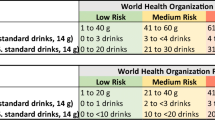Abstract
Rationale
Smoking withdrawal has been widely established to produce a range of impairments to the quality of several major domains of cognitive function including attention, working memory and episodic memory.
Objectives
This study was conducted to determine the degree to which smoking withdrawal will produce impairments in cognitive function in phase I clinical trials.
Methods
Healthy male volunteers who were housed in a clinical trial facility for 16 days underwent periods of ad libitum smoking and smoking withdrawal.
Results
Smoking withdrawal disrupted aspects of attention and episodic verbal recall and recognition.
Conclusions
This study confirms previous work showing cognitive declines in smoking withdrawal and illustrates that such effects occur in ongoing safety and tolerability studies of new medicines and thus require careful consideration for the assessment of cognitive function in such trials as well as the accurate attribution of adverse events to the safety profiles of the medicines.






Similar content being viewed by others
References
APA (2000) Diagnostic and statistical manual of mental disorders, 4th ed, text revision. American Psychiatric Association, Washington
Dunbar G, Boeijinga PH, Demazieres A et al (2007) Effects of TC-1734 (AZD3480), a selective neuronal nicotinic receptor agonist, on cognitive performance and the EEG of young healthy male volunteers. Psychopharmacology (Berl) 191:919–929
Fagerstrom KO (1978) Measuring degree of physical dependence to tobacco smoking with reference to individualization of treatment. Addict Behav 3:235–241
Heishman SJ, Kleykamp BA, Singleton EG (2010) Meta-analysis of the acute effects of nicotine and smoking on human performance. Psychopharmacology (Berl) 210:453–469
Hendricks PS, Ditre JW, Drobes DJ, Brandon TH (2006) The early time course of smoking withdrawal effects. Psychopharmacology (Berl) 187:385–396
Hughes JR (2007) Effects of abstinence from tobacco: valid symptoms and time course. Nicotine Tob Res 9:315–327
Kitagawa H, Takenouchi T, Azuma R et al (2003) Safety, pharmacokinetics, and effects on cognitive function of multiple doses of GTS-21 in healthy, male volunteers. Neuropsychopharmacology 28:542–551
Kroon LA (2007) Drug interactions with smoking. Am J Health Syst Pharm 64:1917–1921
Kumari V, Gray JA, Ffytche DH et al (2003) Cognitive effects of nicotine in humans: an fMRI study. NeuroImage 19:1002–1013
Lenz RA, Baker JD, Locke C et al (2012) The scopolamine model as a pharmacodynamic marker in early drug development: a new paradigm? Psychopharmacology 220:97–107
Loughead J, Ray R, Wileyto EP et al (2010) Effects of the alpha4beta2 partial agonist varenicline on brain activity and working memory in abstinent smokers. Biol Psychiatry 67:715–721
Mendrek A, Monterosso J, Simon SL et al (2006) Working memory in cigarette smokers: comparison to non-smokers and effects of abstinence. Addict Behav 31:833–844
Merritt PS, Cobb AR, Moissinac L, Hirshman E (2010) Evidence that episodic memory impairment during tobacco abstinence is independent of attentional mechanisms. J Gen Psychol 137:331–342
Myers CS, Taylor RC, Moolchan ET, Heishman SJ (2008) Dose-related enhancement of mood and cognition in smokers administered nicotine nasal spray. Neuropsychopharmacology 33:588–598
O'Neill WM, Hanks GW, White L et al (1995) The cognitive and psychomotor effects of opioid analgesics. I. A randomized controlled trial of single doses of dextropropoxyphene, lorazepam and placebo in healthy subjects. Eur J Clin Pharmacol 48:447–453
Parrott AC, Garnham NJ, Wesnes K, Pincock C (1996) Cigarette smoking and abstinence: comparative effects upon cognitive task performance and mood state over 24 hours. Hum Psychopharmacol 11:391–400
van Harten J, Stevens LA, Raghoebar M et al (1992) Fluvoxamine does not interact with alcohol or potentiate alcohol-related impairment of cognitive function. Clin Pharmacol Ther 52:427–435
Wesnes K, Pincock C (2002) Practice effects on cognitive tasks: a major problem? Lancet Neurol 1:473
Conflict of interest
This study was sponsored by Johnson & Johnson Pharmaceutical Research & Development. The company had a major input for the study design, collection, analysis and interpretation of data and writing of the reports. Keith Wesnes is an employee of Bracket, owners of the CDR System cognitive tests and suppliers of the tests for use in this study, as a service to the sponsor. Chris Edgar was also an employee of Bracket during the conduct of the study. Iva Kezic and Peter de Boer are employees of Johnson & Johnson Pharmaceutical Research & Development. Hiba Mahde Salih was Principal Investigator at the site where the study was conducted, Clinical Pharmacology Unit Antwerp—SGS, which ran the study as a service to the sponsor.
Author information
Authors and Affiliations
Corresponding author
Rights and permissions
About this article
Cite this article
Wesnes, K.A., Edgar, C.J., Kezic, I. et al. Effects of nicotine withdrawal on cognition in a clinical trial setting. Psychopharmacology 229, 133–140 (2013). https://doi.org/10.1007/s00213-013-3089-6
Received:
Accepted:
Published:
Issue Date:
DOI: https://doi.org/10.1007/s00213-013-3089-6




